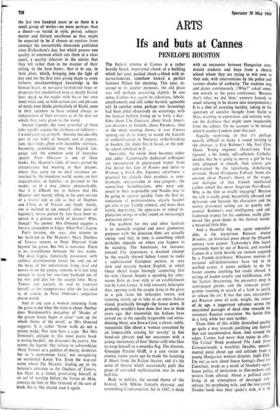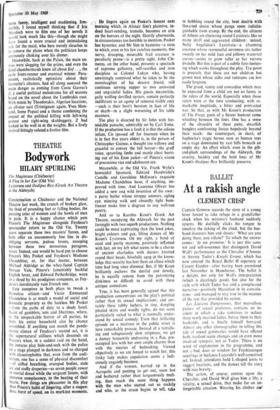Ifs and buts at Cannes ARTS
PENELOPE HOUSTON
The festival cinema at Cannes is a rather heavily bland, impersonal chunk of a building which last year, packed chock-a-block with in- surrectionaries, somehow looked a perfect Summer Palace for storming. This year, re-
stored to its quieter purposes, the old place
was still perhaps quavering slightly. In one sense, Cannes was again its ridiculous, febrile, anachronistic and still rather barmily agreeable self. In another sense, perhaps not. Screenings had been piled obsessively on screenings, with the festival bulletin listing up to forty a day: films about Che Guevara, about black Ameri- can deserters in Sweden, about Rhodesia. And at the main evening shows, le tout Cannes turning out in its finery to watch the hazards of collectivisation in Moravia, strike-breaking in Sweden, life under fire in Israel, or the pub- lic school rebellion in If ...
Inevitably, the whole show becomes odder and odder. Eccentrically dedicated colleagues are encountered in glassy-eyed transit from The Secret Sex Life of Romeo and Juliet to Without a Stitch On; Japanese advertisers, a practical lot, classify their products as sexy- dramatic, sexy-costume or sexy-gangster; the censor-free Scandinavians, who were sup- posed in their responsible and Nordic way to be going to recover quickly from the first in- toxication of permissiveness, clearly haven't got over it yet. Faintly comical, and more than faintly depressing, the apparatus of naked ex- ploitation swings in orbit round an increasingly dislocated centre.
The problem for this and other festivals is to reconcile original and more glamorous purposes with the direction films are actually taking—and that, in turn, is something which probably depends on where you happen to be standing. The Americans, for instance, entered The Apartment, a doomed attempt by the usually shrewd Sidney Lumet to make a sophisticated European picture, in very slow and severely broken English, in which Omar Sharif keeps hissingly suspecting that his wife (Anouk Aimee) is spending her after- noons Belle de Jour style at an establishment run by Lotte Lenya. A wild romantic helicopter shot, opening with the couple lying in the grass in a gale from the helicopter rotors, and tottering slowly up to take in an entire Italian island, practically brought the house down. It probably wouldn't have done that two or three years ago. But meanwhile the Italians have moved on, to the equally forgettable and attitu- dinising Metti, una Sera a Cend, a clever, sickly, voyeuristic film about a 'woman consumed by an irrepressible craving for novelty' (a fine hand-out phrase) and her encounter with a young 'mercenary of love' (better still) who likes to wrap himself in a swastika flag. The director, Giuseppe Patroni Griffi, is a rare visitor to cinema (some years ago he made the haunting II Mare) from the Italian theatre; and it's his sense of theatre which occasionally pulls this piece of corroded sophistication into its own half-life.
Back to politics, the second theme of the festival, with Miklos Jancs6's dynamic and astonishing Confrontation. Set in 1947, it deals with an encounter between Hungarian com- munist students and boys from a church school whom they are trying to win over to their side, with interventions by the police and various shades of authority. The students sing
and dance continuously. ('Why?' asked some- one naïvely at the press conference. 'Because that's what we did then,' answers Jancs6, as usual refusing to be drawn into interpretation.)
It is a film of arresting lucidity, taking in the spectrum of socialist thought from Stalin to
Mao, dazzling in expression, and entirely with- out the drabness that might seem inseparable from the subject. On no account to be missed when it reaches London, later this year.
Equally surprising, in that it's perhaps equally difficult to make it sound inviting in the abstract, is Eric Rohmer's Ma Nuit Chez Maud. Young engineer (Jean-Louis Trin- tignant), a bit lonely, self-sufficient, Catholic, decides that he is going to marry a girl he has only glimpsed in church, then almost gets side-tracked by the tantalising, disbelieving divorcée, Maud (Francoise Fabian). Some dis- cussion about Pascal's theory of the wager, and dialogue of that French intellectual calibre which has never forgotten Port-Royal. Why is the film so totally engaging? Because the talk is really good. beautifully phrased and delivered, and because the characters and the wintry provincial setting are so quietly sub- stantial. Rohmer's cool intelligence, and old- fashioned respect for his audience, really glim- mered like good deeds in this festival world: a beautiful little film.
And a beautiful big one, again unpredict- able, is the mysterious Russian Andrei Roublev, an historical piece about the fifteenth century icon painter. Tarkovsky's film hasn't previously been let out of Russia, and reached Cannes in a fairly heavily cut version acquired by a French distributor. Whatever motives of national self-defensiveness have led to its muffled career, it seems unlikely to do the Soviet cinema anything but credit abroad. A setting of leaden cruelty and indifference, with the Tartars threatening, the peasantry deep in semi-pagan gloom, and the itinerant priest- painter roaming in search of a faith to justify or release his art. It has that rare, extraordin- ary Russian sense of scale, weight, the values of its age, a juggernaut advance across the occasional passages of dead time towards the visionary Russian conscience. No Soviet film in a long while has seen farther. Three films of this wildly diversified quality go quite a way towards justifying any festival that can accommodate them. And around the edges, Cannes had more than nudes to offer. The Critics' Week produced The Lady from Constantinople, a watchful, likeable, unsenti- mental piece about age and solitude from a young Hungarian woman director, Judit Elek. I'm not so sure about Susan Sontag's Duet for Cannibals, made as a result of Sweden's open- house policy of invitations to film-makers and writers from -abroad. About a political exile living in an atmosphere of deranged con- spiracy, his perplexing wife, and the two young Swedes lured into their spider's web, it is by turns funny, intelligent and maddening. Irre- sistibly, I found myself thinking that if Iris Murdoch were to film one of her novels it would look much like this—though she might have found a more crucial and intimidating role for the maid, who here merely slouches in to remove the plates when the politician keeps ominously choking over his dinner.
Meanwhile, back at the Palais, the main en- tries were slogging for the prizes, and even the hotel chambermaids knew all about Eel the early front-runner and eventual winner. Para- mount, realistically optimistic about their favourite's chances, had all along assessed the main danger as coming from Costa Gavras's Z, a useful political melodrama for all seasons based on the novel about the Lambrakis case. With music by Theodorakis, Algerian locations, an all-star cast (Trintignant again, Yves Mon- tand, Irene Papas) and a theme combining the impact of the political killing with left-wing protest and right-wing skulduggery, Z had looked to be well in at the weights. But a lively festival fittingly saluted a livelier film.



































 Previous page
Previous page